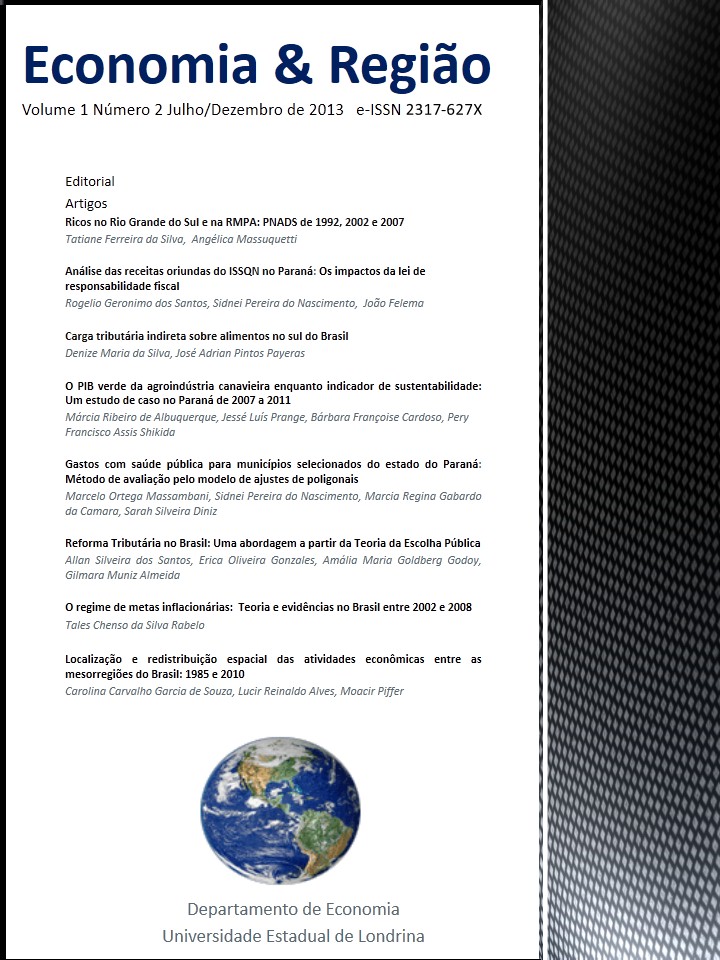Analysis of revenue from TSAN in Paraná: the impacts of fiscal responsibility law
DOI:
https://doi.org/10.5433/2317-627X.2013v1n2p26Keywords:
, Income per capita TSAN, Fiscal Responsibility Law, ConcentrationAbstract
Brazil is as one of the countries with the highest tax burden in the world. Such taxation is necessary to cover the costs of services that are characteristics of the State and are demanded by society. However, the municipalities' taxes have not shown significant impacts on city budget revenues. The objective of this study is to analysis the behavior of the collection per capita Tax on Services of Any Nature (TSAN), in the state of Paraná, in the period 1997-2011 with the impacts of the Fiscal Responsibility Law (FRL). The methodology is divided in two parts; first one deals with the theoretical discuss of taxation me, the second presents the spatial distribution of the collection of municipal taxes is determined through the use of techniques of Exploratory Spatial Data Analysis (ESDA) - Index Moran Local and Global - to verify spatial autocorrelation between the municipalities of Parana and confirm the existence of spatial cluster. The results shown that in the period 2005-2011, there was an increase in the concentration of municipalities around the mesoregion of Curitiba in the clustering pattern high-high. Thus, it appears that the mesoregions "less expressive" of Parana, with respect to revenue per capita of the TSAN with the same intensity from mesoregion Metropolitan of Curitiba and mesoregion Center East.Downloads
References
ANDRADE, N.A. Planejamento governamental para municípios. São Paulo: Atlas, 2006.
ALMEIDA, E. Curso de econometria espacial aplicada. Piracicaba: ESALQ-USP, 2004.
ANSELIN, L. (2005). Exploring spatial data with geode: a workbook. University of Illinois, Urbana-Champaing. Disponível em: https: //geodacenter.asu.edu/system/ files/GeodeWorkbook. Pdf. Acesso em: 11 nov.2012.
ANSELIN, L.; FLORAX, J. G. M. Small Sample of Tests for Spatial Dependence in Regression Models: some further results. In: ANSELIN, L. E FLORAX, R. J. G. M. (ed.). New Direction in Spatial Econometrics. New York: Springer, 1995.
BARRETO, A.F. Curso de Direito Tributário Municipal. São Paulo: Editora Saraiva, 2009.
IBGE. Instituto Brasileiro de Geografia e Estatística - IBGE. Disponível em: http://www.ibge.gov.br. Acesso em: 25 de outubro de 2012.
BRASIL. Instituto de Pesquisa Econômica Aplicada - IPEA. Disponível em <http://www.ipeadata.gov.br>. Acesso em: 24 abr. 2013.
BRASIL. Ministério da Fazenda. Secretaria do Tesouro Nacional. Disponível em: http://www.receita.fazenda.gov.br. Acesso em: 23 out. 2012.
DIAS, M.A. James Buchanan e a "Política" na Escolha Pública. Ponto-e-vírgula, v. 6, p. 201-217, 2009. Disponível em: http://www.pucsp.br/ponto-e-virgula/n6/artigos/pdf/pv6-16-marcoantonio.pdf. Acesso em: 14 mar. 2013.
DINIZ, S.S.; CAMARA, M. R. G.; MASSAMBANI, M.O.; ANHENESI, J.A.R.; SESSO FILHO, H. A. análise espacial da produtividade da laranja dos municípios do estado de São Paulo: 2002-2010. In:CONGRESSO DA SOBER, 50. 2012, Vitória - ES. Anais... Vitória: SOBER, jul. 2012.
GIAMBIAGI, F.; ALÉM, A.C. Finanças públicas: teoria e prática no Brasil. Rio de Janeiro: Editora Campus, 2000.
LINO, P. Comentários à Lei de Responsabilidade Fiscal. São Paulo: Atlas, 2001.
LIMA, E. A. A Interpretação do ISSQN à luz da Constituição Federal, em detrimento à jurisprudência pacífica do STJ. Tributação no local da prestação de serviços é inconstitucional. Jus Navigandi, Teresina, ano 8, n.65, maio 2003. Disponível em: http://jus.com.br/revista/texto/4043. Acesso em: 03 abr. 2013.
MARTINS, I.G. da S. M.; PEIXOTO, M.M. ISS - LC 116/2003. Curitiba: Juruá, 2008.
MARTINS, E.C.; ALMEIDA, D.C; SANTOS, G.A.L. A Arrecadação Municipal do ISSQN (Impostos Sobre Serviço de Qualquer Natureza), em função da Lei Federal 116/2006. Anuário de Produção de Iniciação Científica Discente. v. 13, n.16, p.137-148, 2010. Disponível em: http://www.sare.unianhanguera.edu.br Acesso em: 29 out. 2012
MELO, J.E.S. ISS: aspectos teóricos e práticos. 4.ed. São Paulo: Dialética, 2005.
MONTEIRO, S.T.M. Auditoria fiscal nos tributos municipais: a substituição tributária no ISSQN após o advento da Lei Complementar nº 116/2003 e as alterações na legislação tributária de Fortaleza. 3º Lugar no Prêmio Sefin de Finanças Municipais. Disponível em: http://www3.sefin.fortaleza.ce.gov.br. Acesso em: 23 out. 2012.
OLIVEIRA, J.J. DE M. Impostos Municipais: ISS, IPTU, ITBI. São Paulo. Saraiva, 2009.
PARANÁ. Instituto Paranaense de Desenvolvimento Econômico - IPARDES. Disponível em: http://www.ipardes.gov.br Acesso em: 13 mar. 2013.
PIMENTEL, E.; HADDAD, E. A Análise da distribuição espacial da renda no estado de Minas Gerais: Uma abordagem setorial. São Paulo: NEREUS. FEA-USP, 2004. Texto para discussão
PEROBELLI, F. S.; FERREIRA, P. G. C. ALMEIDA, E. S. Existe convergência espacial da produtividade agrícola no Brasil? Rio de Janeiro, v. 46, n. 1, p. 031-052, jan/mar. 2008.
REIS, F.A.S. ISSQN: local de pagamento ou de incidência tributária. Jus Navigandi, Teresina, ano 9, n. 99, out. 2003. Disponível em http://jus.com.br/revista/texto/4223. Acesso em: 24 abr. 2013.
RIANI, F. Economia do Setor Público: uma abordagem introdutória. 3. Ed. São Paulo: Atlas, 1997.
RIBEIRO, E.C.B.A. Convergência de renda local entre os municípios brasileiros para o período 2000 a 2005. 2010. Dissertação (Mestrado em Economia) - Faculdade de Economia da Universidade Federal de Juiz de Fora, Juiz de Fora, 2010.
SPITZCOVSKY, C.; MOTA, L.P. Direito Constitucional. 9. ed. Rio de janeiro: Forense: São Paulo, 2008.
TEIXEIRA, R.F.A.P.; ALMEIDA, E.S.; OLIVEIRA JÚNIOR, L.B.; FERNANDES, H.S. Produtividade e logística na produção do biodiesel. Revista FEEv. 31, n. 1, p.7-30, 2009
Downloads
Published
How to Cite
Issue
Section
License
Copyright (c) 2013 Economia & Região

This work is licensed under a Creative Commons Attribution 4.0 International License.
Economia & Região adota a Licença Creative Commons Attribution CC-BY 4.0 International, portanto, os direitos autorais relativos aos artigos publicados são do(s) autor(es), que cedem à Revista Economia & Região o direito de exclusividade de primeira publicação.
Sob essa licença é possível: Compartilhar - copiar e redistribuir o material em qualquer suporte ou formato. Adaptar - remixar, transformar, e criar a partir do material, atribuindo o devido crédito e prover um link para a licença e indicar se mudanças foram feitas.




















